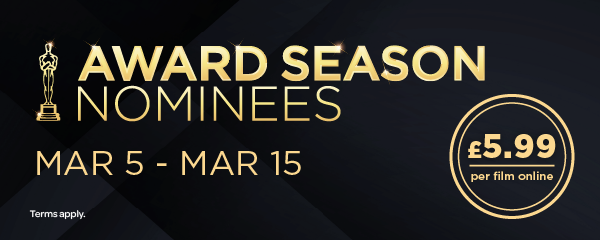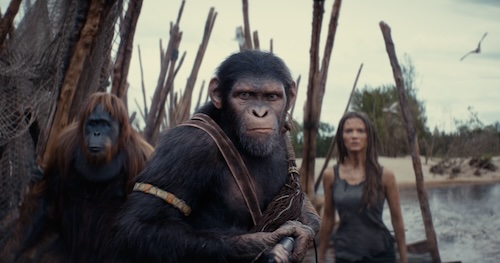
Kingdom of the Planet of the Apes resonates with bestial power, from its photo-realistic performance capture effects to the layered sounds of the various ape factions that tear across the screen.
Much of the film's visceral impact owes itself to composer John Paesano who was compelled to mix and match a host of musical styles stemming from the classic Apes franchise.
We caught up with John to discuss his approach to the movie, his collaboration with director Wes Ball and what it meant to acknowledge his compositional predecessors.
With the film and soundtrack now on release, how have people reacted to your music?
It's funny, when Wes and I are working, we're in such a bubble. Only the crew knows what the composer is doing at the time and of course the studio. There's never really this pressure of, 'Oh, what will people think?'
While scoring, I'm focused on how the music serves the film, rather than the music on its own. How is it working with the picture? Am I giving Wes everything that he wants? Am I getting everything in there that the studio wants?
The night before the film came out, I realised how much I would be compared to what had come before in the franchise. And let's be honest, what came before was incredible. The previous trilogy starring Andy Serkis was a terrific relaunch.
Wes had such a clear vision when he started this project. He wanted us to honour the 1968 score that was composed by Jerry Goldsmith. That score was iconic and changed the landscape of film scoring from the 1960s into the 1970s.
It was so different from what audiences were used to hearing at the time. It upended the entire scoring industry and what one was able to do with the medium. He used this method called serialism, which is a type of compositional discipline. It was very avant-garde and modern. He also developed a very specific tone row and use of musical scales.
Jerry's music was like a whole new language. So, we wanted to honour that in some way. But then we're also coming off this hugely successful reboot trilogy. We couldn't just ignore what had come before us. Wes realised we had to honour what had come before and bring along this fanbase, taking them into a new place.
First, I had to learn the language of what Jerry had done, and also what Michael Giacchino had developed on Dawn for the Planet of the Apes and War for the Planet of the Apes. I had to find some commonality. Was there going to be a way to smash all these things together and create our own space?
It's always a tricky thing with these franchises. Late in the process, I wrote to Michael telling him what an inspiration he was to me. I shared some of the score with him and joked that while he had to deal with the legacy of Goldsmith, I had to deal with Goldsmith and you. [laughs]
Michael was a huge inspiration when I first got to Hollywood. He made me realise there's a place for people like us who prioritise an orchestral approach in film scoring. A person who likes the older orchestral sound is capable of fitting in.
I would listen to Michael's music and think, yeah, that's a guy doing the thematic John Williams thing in this era of modern filmmaking. As a professional, I've always followed Michael's career with interest. I consider my sound to be of that world, whether it's the Spider-Man game I worked on, the Avengers campus over at Disneyland, or the animated films I've worked on.
I therefore felt at home in the Planet of the Apes saga. I just had to figure out a way to honour those predecessors and carve out a new path.
The irony is that while artists like yourself and Michael are flying the flag for traditional symphonic scoring, Goldsmith's original Planet of the Apes score is, as we've said, brutal, avant-garde and surreal. How much of that tone was parlayed into your score for Kingdom of the Planet of the Apes?
Wes tipped a lot of the art direction and production choices in the direction of the 1968 film, which was an advantage to me. Everything from the costumes to the set designs to the Forbidden Zone idea gave this sense of a landscape that lent itself to quotations from Jerry's music.
When we first did the human hunt sequence, it was temped with a John Williams cue called The Ferry Scene, which came from his War of the Worlds score. That's one of my favourite scores of all time. Whenever Wes and I work on something, the nature of those cues rubs off. It could be a My Little Pony movie and it would still show influence from War of the Worlds.
Of course, the influence of that score is felt in tons of films. But as much as we love that particular cue, it didn't work with the hunt sequence. The music had a darkness that didn't quite match what we were seeing on the screen.
It turned out to be a tricky nut to crack, musically. I then laid in some of Jerry's music and played around with the arrangement. All of a sudden, everything locked into place. No matter how long ago that cue was written, it's burned into our collective psyches.
However, we couldn't simply do what Jerry did back in the 1960s as we're in a different sonic landscape now with Dolby Atmos, IMAX and so forth. But we wanted to take the fabric of what Jerry had composed and bring it into the 21st century.
We beefed up the arrangement while still trying to keep it as primal as possible. We maintained the character of [archaic horn instrument] the shofar and the ram's horn calls. People assume there's a lot more Jerry and Michael in the score than there actually is, and I consider that one of the highest compliments I've received about the music.
The only sequence that quotes Michael's music is the opening funeral scene. There's no other quotation from Dawn or War. However, the music had to feel like it was part of that world. People have even assumed I've quoted from Rise of the Planet of the Apes, which was scored by Patrick Doyle, but there's not. It's the musical language that's the same.
In a weird way, it's mission accomplished. It's our own motifs and thematic ideas but utilising existing musical language. It's the same with Jerry's material. The first 35 to 40 seconds of 'Human Hunt' is full Jerry, albeit with a different arrangement. We're not using the piano as the main line, but low strings instead so it's a bit beefier and grittier.
After that initial 40 seconds, it goes into its own thing, all the while utilising Jerry's tone row. It feels like it's of that world even though it's our own take on it. From the beginning, Wes said the score had to be one part Jerry and one part Michael, and the rest would be all me.
Of course, Rise was also an incredible film and set this whole new thing in motion. I almost feel bad not mentioning it, but tonally we're closer to the events of Dawn and War. We're part of the canon that refers to Caesar's dominance and legacy. It was therefore imperative that we maintained a sense of focus on Michael's sound.
Your collaboration with Wes Ball goes back to the Maze Runner films. Even in Wes's short film that he'd made before that, Ruin, I thought I could hear a lot of John Williams in the music.
Interestingly, it wasn't me who worked on Ruin, it was a composer named Kevin Riepl. I was even surprised to get the Maze Runner gig, to be honest. But yes, Ruin was an amazing short. Even today, it looks fantastic. And Kevin did a great job. I remember hearing his music for Ruin and just assuming that I'd take my name out of the running for The Maze Runner.
Wes and I grew up on the same stuff. I always tell aspiring composers that when you reach a certain stage in Hollywood, you realise that people in the industry are really good at what they do. Everyone writes music at a very high professional level.
What separates people and what determines who gets what job are common interests. Certain filmmakers like working with certain composers because they feel comfortable with them. They have a shorthand. Wes and I, for example, are really casual guys and we love wearing hats. We hang out together. We're into the same stuff.
When you have that kind of common ground with someone, it's comforting. Wes can say, 'John, this music is crap, write something better.' I can then tell him, 'You're crazy, man, you're making a bad decision.' You want a level of comfort that allows you to enjoy that level of dialogue.

It is a process. There are 16 to 17 versions of specific cues in this film. Sometimes it's not just back and forth on the music itself, but it's about where we want the music to go. Wes has a very specific plan and I'm also fighting for what I want. If you're in the trenches for 12 to 18 months, you want to ensure you're with someone with whom you get along.
When Wes and I first met for The Maze Runner, we almost knew each other straight off the bat. We meshed well in terms of films that we grew up with and scores that we liked.
You mentioned IMAX earlier and we're in an era now where special formats like IMAX can do extraordinarily immersive things with music and sound design. Is that a consideration when you're scoring a film?
Yeah, I mean as much as it's awesome for music, it's tough, too. Very often you're battling with more sound. It's two-fold. Wes had a very clear vision for Apes. He wanted to ensure that the audience was right there alongside the apes. He wanted it to be an immersive experience in which they would feel the world.
Film music often has a strange tendency to lift audiences out of a movie. In a way, it reminds them that they're watching a movie in the first place.
Music can enhance the fantasy aspect, which is either a positive or negative attribute.
Yeah, exactly. And Wes wanted to avoid that where possible. The scores for Dawn and War are mixed right there alongside the dialogue. It has a very emotional feel to it. I love it. But Wes had a different plan for this film. He wanted the apes to feel grounded and real to the extent that the spell wouldn't be broken by the use of music.
Going too hard with the music almost made the film feel like The Jungle Book. This film isn't as dark as the previous two. It's very sunny and it's a brighter film. It has a more adventurous feel. So, in a weird way, Wes wanted to offset that by making the film feel more real.
In a lot of cases, the sound is put forward. If you listen to the soundtrack away from the film, the music is very big and lush. But in the movie, Wes didn't want the size of the music to push the audience out too much. We have our emotional moments but in big fight sequences, the score is living there without being right up in your face.
Wes really wanted the audience to be focused on the dialogue. There's so much story and character explanation that needs to happen in order to teach the audience about the evolution of the world. It was pivotal that the audience understood the story that was being told and who the characters were.
Wes had to thread the needle perfectly and one can't do that in a short amount of time. However, it can't go on for too long as people start to get antsy. People see this as the fourth film in a series and it's really not. It's the start of a whole new world.
In the Andy Serkis trilogy, the stories split the difference between CG apes and live-action human characters whereas now it's almost entirely ape-driven. What challenges did that present for you?
It's interesting because we did temp with some stuff from Dawn and War and it just didn't work the same way, as much as we wanted it to. We got away with it in the one sequence at the beginning. The musical palette still works but the way that the music functioned in Matt and Michael's films was very different from this one.
Caesar was this very emotive leader whereas our hero Noa is this very young, innocent ape. He goes off on this adventure and we couldn't be so dour with the music. The score had to be much more adventurous and tied into our learning of the outside world. But people will naturally make comparisons.
When I saw the new Star Wars movies, it was impossible not to compare them with what had come before. I couldn't imagine being Michael Giacchino in place of John Williams having to write the music for Rogue One.
You're going to get compared. It's part of the deal. However, it's an interesting challenge.
Well, it's a challenge you've pulled off brilliantly in this particular score. It's a real musical tightrope act and it's an asset to the film. This may be a loaded question, but would you like to come back for more?
I would work on anything that Wes touches. Wes really insulates me from the extreme pressure that stems from working in the studio system.
He's so focused on the fanbase. When one works in Hollywood for a long time, one inevitably narrows one's aperture to solely focus on the L.A., New York and London crowd. Wes, however, is so focused on the global fanbase. He and I were both fans before we were doing this. That's why we're doing this. I love working with him in that regard. There's a fun nostalgia sizzling underneath all of his projects.
But yes, I would love to come back.
Click the link below to book your tickets for Kingdom of the Planet of the Apes. The film is on release now at Cineworld.
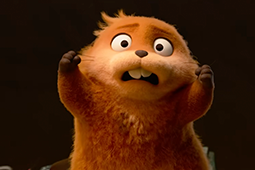
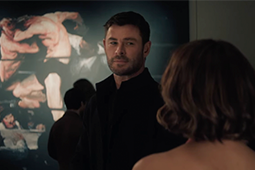
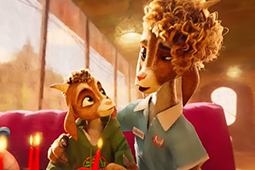
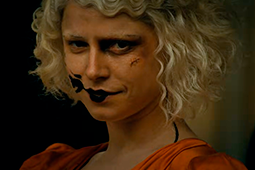
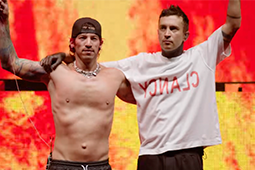
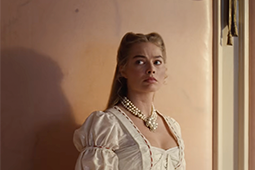
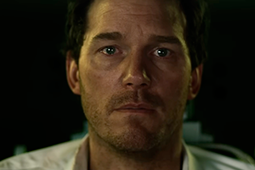
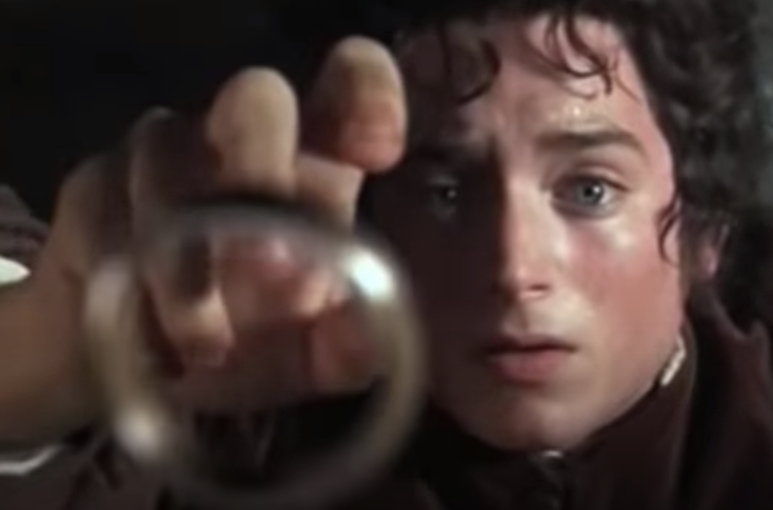
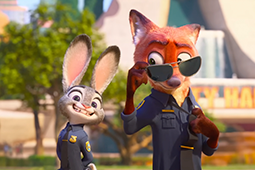
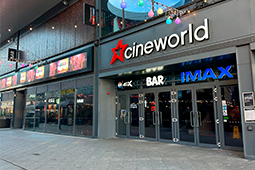



.jpg)
.png)



